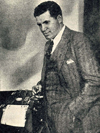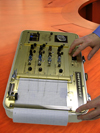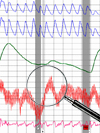 |
 |
 | |
History of Lie Detection
This segment of the training course provides a comprehensive overview of the psychophysiological detection of deception evolution spanning time from primitive and, typically, inhumane methods of detecting deception to modern, civilized, and scientifically based methods and techniques. Instructions focus on the evolution of the multichannel polygraph beginning with John Augustus Larsonís first polygraph invented in 1921 and finishing with the most advanced polygraphs of our era manufactured by Lafayette Instrument Company. Lectures familiarize students with prominent individuals who have made outstanding contributions to the field of psychophysiological detection of deception.
|
|
 | |
Psychophysiology
Instruction is provided on the major human physiological systems pertaining to the application of psychophysiological detection of deception. Lectures focus on the integrated functions of the electrodermal, cardiovascular, respiratory, nervous, muscular and skeletal systems of the human body as they relate to the reactions registered by the polygraph instrumentation. Regarding psychology, emphasis is placed on the psychological processes underlying human behavior and their effect on polygraph examination results. Covered topics include, among others, psychological disorders, personality, stress, perception, motivation, emotion, memory, sensation, social psychology, and social processes.
|
|
 | |
Instrument Operation
This portion of the training course involves a scrupulous study of polygraph instrumentation utilized in the psychophysiological detection of deception. Students are introduced to conventional polygraphs available in CPI's collection and acquire proficiency in administering examinations on the most sophisticated computerized polygraph instrumentation in the world manufactured by Lafayette Instrument Company. Students study meticulously the polygraph and all of its components, covering their construction, operation, functionality, troubleshooting, calibration, and maintenance. Additionally, students are instructed on the proper configuration of the polygraph examination room.
|
|
 | |
Question Formulation
This portion of the training course covers one of the most integral phases of the polygraph examination process, which includes the identification of the correct issue and the formulation or construction of test questions. Properly formulated and placed test questions elicit the corresponding physiological responses from suitable subjects and are critical to accurate chart interpretation. Students will master the formulation of the various types of the most appropriate test questions utilized in psychophysiological detection of deception by means of rigorous practical exercises based upon simulated crime scenarios. Test question formulation exercises are conducted on a daily basis.
|
|
 | |
Polygraph Techniques
Students are introduced to numerous polygraph techniques (Peak of Tension, Relevant/Irrelevant, Zone techniques, MGQT, to name a few) and achieve proficiency in all validated and most accurate techniques available to polygraph examiners for both commercial and law enforcement testing. Students learn to determine or select the most appropriate and effective technique for utilization in a specific situation under investigation. Lectures provide comprehensive information on the nature, purpose, structure, and sequence of polygraph techniques utilized during polygraph examinations. Every taught technique is applied and practiced by students in simulated scenarios on a regular basis.
|
|
 | |
Chart Analysis
Chart analysis is one of the most important phases of a polygraph examination. During this phase a polygraph examiner renders his conclusion (possibly life-altering) regarding the truthfulness of the examinee. This portion of the course teaches understanding and interpretation of the physiological variables registered by the polygraph, facilitating accurate polygraph examination conclusions. Lectures include chart markings, chart analysis theory, numerical evaluation development, factors affecting physiological responses, specific responses indicative of deception, computerized scoring algorithms, etc. Students achieve a high level of proficiency in chart interpretation through rigorous daily practical exercises in chart analysis.
|
|
 | |
Interviewing Procedures
This segment of the course teaches several pre-test and post-test interviewing methods practiced through class exercises based on simulated crime scenarios. Interviewing skills allow polygraph examiners to obtain information vital to formulating proper test questions, as well as obtaining admissions and confessions from deceptive subjects. Students are taught effective interrogation techniques, build rapport with examinees (properly preparing them for testing), ascertain critical information, analyze nonverbal and unwitting verbal cues, and understand cultural aspects pertaining to lie detection. In addition, instructions are provided on effective procedures to follow when using an interpreter in a polygraph examination.
|
|
 | |
Polygraph Skills Development
This phase of the course involves practice sessions conducted regularly throughout the course using the most advanced polygraph instrumentation. Students are required to resolve the issue under investigation after receiving hypothetical case facts from their instructors. They structure and conduct a complete polygraph examination under simulated, however, realistic conditions. The entire process is supervised and critiqued by instructors. Such sessions assist students in developing required polygraph skills, gaining confidence, and preparing them for the proper conduct of examinations in real-life situations. To complete the course students must exhibit competence in administering polygraph examinations.
|
|
 | |
Legal Aspects
This portion of the training course covers fundamental legal matters relevant to psychophysiological detection of deception in the United States of America, as well as the country where the training is conducted. Lecture materials on legal matters covered during the course pertain to both commercial and law enforcement polygraph application, and emphasize appropriate methods of testifying as an expert witness in administrative hearings, civil and criminal court proceedings. Students also study several important U.S. Supreme Court legal cases involving the use of the polygraph, and conditions allowing the admissibility of polygraph examination results as evidence in a court of law.
|
|
 | |
Ethics Aspects
Integrity and ethics are a vital part of the polygraph profession therefore the CPI dedicates a significant amount of time lecturing on ethics aspects affecting psychophysiological detection of deception. Our lectures instruct future polygraph examiners on their obligations to polygraph examinees, clients, their employers, colleagues, and the polygraph profession itself, from the point of view of ethics. CPI students are required to study both the Code of Ethics and Standards of Practice of the International League of Polygraph Examiners. In addition, students study practical cases involving ethics issues, with the purpose of preparing them for real life situations they may be confronted with following graduation from CPI.
|
|
 | |
Polygraph Research
In order for polygraph examinations to be of value to society, the polygraph techniques employed by polygraph examiners must be scientifically reliable and valid. Consequently, this portion of the course focuses on exposing students to research concerning the validity and reliability of polygraph techniques. Students are introduced to the various research theories pertaining to psychophysiological detection of deception and are provided with data on their relative virtues. Students also learn scientific research terminology and receive reading assignments regarding past and current scientific studies on validated polygraph techniques. Reading materials are available from the extensive CPI library.
|
|
| | |
|
|